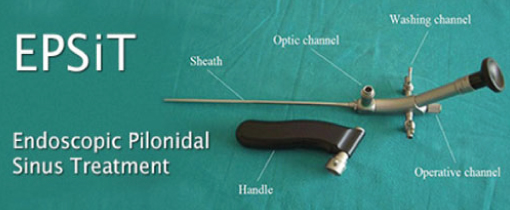Minimally invasive Surgery applied to the treatment of Pilonidal Sinus (Sacrococcygeal Fistula or Sacral Cyst).
Pilonidal sinus is a common health problem that primarily affects young people. It is an intergluteal cyst that presents recurrent infections in the area. It has a significant impact on the quality of life, causing work and school absenteeism.
Definitive treatment of the disease has not been achieved. The modality with the least recurrence (going out again) consists of the complete resection of the cyst, leaving the wound open and closing it by secondary intention. This option entails a long healing period (around 6 months), with poor quality of life during this time, multiple and annoying cures, and, therefore, a long period of sick leave for the adult, and abandonment of normal activities to a child or adolescent (school, sports, games…etc.).
The most widely used treatment modality consists of complete resection of the cyst with primary closure, sometimes with the need for complicated interventions. This technique requires a healing period of about 6 weeks, has postoperative complication rates of 20%, the same period of absenteeism, and a recurrence rate of up to 40%.
In 2014, Dr. Piercarlo Meinero described for the first time the endoscopic treatment of EPSIT pilonidal sinus and in 2017 Dr. Exposito published the first results performed on the pediatric population. With this modality, there is no impact on the patient’s quality of life, since from the day after surgery the patient can lead a normal life, even in cases of high-performance athletes competitions, presents a healing process of 3 weeks, a complication rate of 1-2% and a recurrence rate of 16%.
Since February 2023, the EPSIT has been available at the PCV, at the request of Drs Piñana and Sánchez Cano, who apply it normally.



